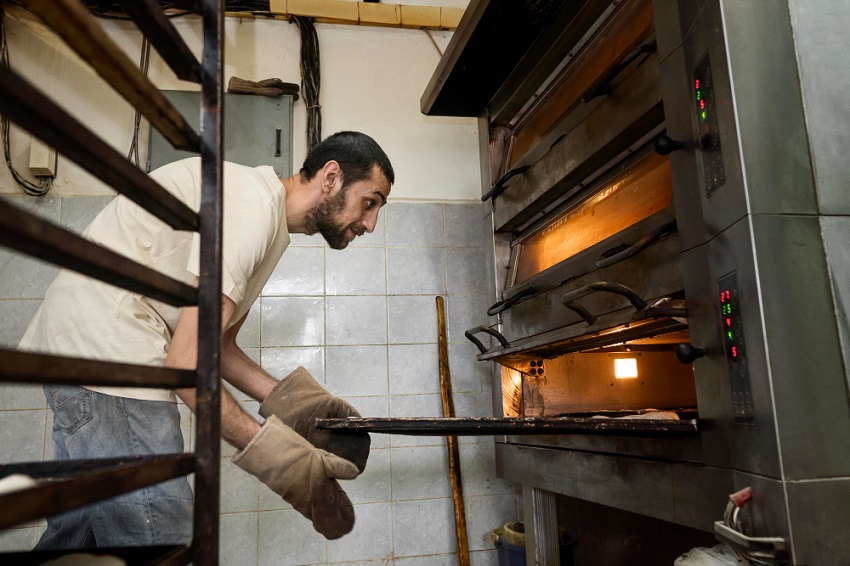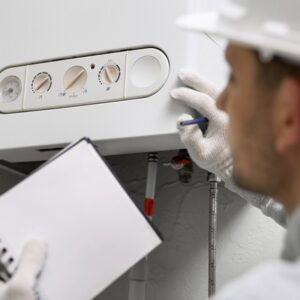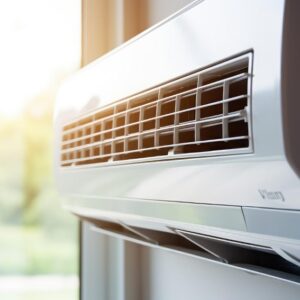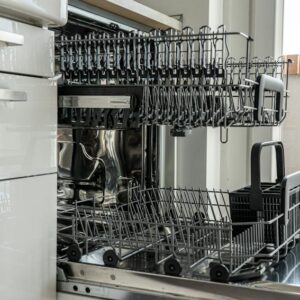Dealing with sticky, burned-on remains in an oven isn’t just annoying. It also degrades flavour and leaves behind unappetising smells. However, cleaning an oven can feel impossible when life is already in overdrive.
Maybe you’ve never even tackled an oven, running on zero sleep, or only have the weekend to breathe before Monday hits. Grease build-up is the last thing you need to deal with.
If that’s the case, this guide is definitely for you. The methods here are quick and easy, so you won’t really need Martha Stewart’s skills to keep your oven shiny.
Select the Right Cookware
The right pan or tray can make cleaning up almost effortless. Deep-rimmed dishes catch drips before they hit the oven. Similarly, ceramic or glass containers hold splashes far better than flimsy metal ones.
If you’re roasting, pop a lid on. It keeps food contained and locks in flavour. Just skip oversized trays. They spill easily and are tricky to handle. Paying attention to your cookware upfront saves you from wrestling with sticky messes later.
Use Protective Liners
A simple liner can be a game-changer. Foil or baking paper on trays and oven bases catches splatters, especially from fatty cuts that love to make a mess.
It’s important to swap them out regularly, as old liners lose effectiveness and could even become a fire hazard.
When using foil, leave airflow gaps for the heat to circulate properly. This tiny, inexpensive step keeps your oven cleaner and makes post-cooking cleanup much quicker.
Address Spills Immediately
When food or grease bubbles over, the faster you act, the easier the cleanup will be. Wipe spills while they’re still fresh. A damp cloth or sponge is usually all you need before anything hardens into a crust.
You can also skip harsh sprays, even though it’s tempting to use an aggressive cleaner, and zap it all away. Gentler cleaners are safer for both your oven and your health.
If you want a nature-friendly alternative, going green is pretty easy with options like Koala Eco or Earth Choice, both of which offer plant‑based, low‑tox formulas.
Tackling small messes as they happen may only take seconds, but it prevents hours of scrubbing afterwards.
Use Splatter Guards
A mesh lid or screen is a simple tool that stops airborne splashes in their tracks. It’s perfect for sizzling bacon, roast meat, or any high-heat cooking. You’ll notice that it keeps the mess contained, without interfering with your food.
Most splatter guards are reusable and easy to clean, making them kinder to the planet than disposable liners. Just rinse or wipe, and they’re ready for next time.
Adding this tiny step means less elbow grease, faster cleanup, and more time enjoying your meal, rather than deep cleaning your oven.
Reduce Cooking Temperatures
Cooking at slightly lower temperatures can save you from a lot of mess. Hot oils and sauces tend to jump and splatter, while gentler heat keeps things calm and contained.
This might come as a surprise to you, but slower cooking can improve flavour. Rich meats and hearty stews often taste better when given time to develop. Just keep a thermometer handy to ensure everything is cooked safely.
Deliciousness aside, you also get a bonus for taking the slow cooking route. Using lower heat saves energy, which is good for both your bills and your cleanup routine.
Schedule Regular Maintenance
A little attention now can save a lot of stress later. Giving your oven a quick check and clean every few weeks keeps grease and grime from building up into a full-blown disaster. It’s a small habit that keeps your cooker running smoothly and extends its lifespan.
For renters, this is a game-changer when it comes to end of tenancy cleaning. Staying on top of maintenance means fewer stubborn marks to tackle and no last-minute scrubbing. You’ll also have a much better shot at getting your full deposit back.
Prevent Build-Up
A few quick wipe-downs here and there can stop sticky messes from becoming permanent residents. Give the inside a bit of attention each month, and you’ll avoid the worst of the baked-on chaos.
Don’t forget the rubber door seal. If it’s not snug, heat escapes, and things start going downhill fast. A simple trick is to close a strip of paper in the door and pull it gently. If it slides out easily, it’s time to replace the seal.
While you’re at it, check the bulb and vent. A clear view and proper steam escape make cooking safer and cleaner.
Run the Self-Cleaning Function
Most modern models include a self-cleaning function that incinerates stubborn grime at high temperatures, turning baked-on grease into ash that’s easy to wipe away. It’s like giving your oven a mini reset.
Use this feature strategically, though. Running it too often can put stress on delicate parts and shorten the appliance’s lifespan.
Aim for a deep clean every month or two, or whenever your oven has seen heavy use, like after a weekend of roasting or baking.
Regularly using the self-cleaning function doesn’t just make scrubbing easier. It also prevents grime from building up, so you’ll avoid stressful, last-minute cleaning sessions.
Choose Recipes with Less Mess in Mind
Some meals are inherently messy! Saucy bakes, fatty roasts, or overstuffed trays often lead to splatters and sticky chaos. If you’re the one in charge of dinner, pick recipes that stay contained.
Small changes make a big difference. So try dry rubs instead of wet marinades, foil-wrapped parcels, or just cooking smaller portions.
And don’t worry, this won’t lead to losing flavour. It’s all about saving yourself the headache when it’s time to clean up. A little planning before cooking lets you enjoy a stress-free kitchen.
Ventilate While You Cook
Steam and smoky vapours love to settle where you don’t want them. Whether you’re frying, roasting, or baking, it’s best to crack a window or switch on the extractor fan.
Good airflow is generally recommended. Not only does this help your cooker stay fresher for longer, but it also keeps the air breathable. Plus, no one wants to eat in a haze.
Ventilation is one of the simplest ways to reduce build-up and keep your kitchen comfortable while you cook.
Conclusion
The best oven cleaning isn’t about scrubbing for hours. It’s about stopping problems before they begin. Prevention is faster, easier, and far less stressful than dealing with baked-on grease later on. Pick one habit, like lining trays with foil or running the self-cleaning function, and make it your new routine. That tiny action alone will keep your oven cleaner and make your life much easier.





